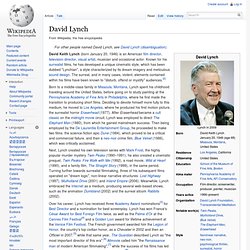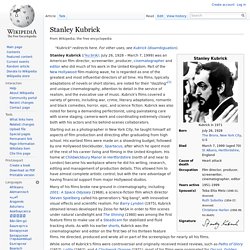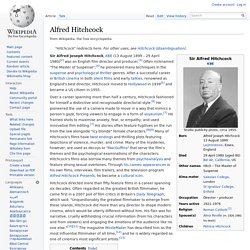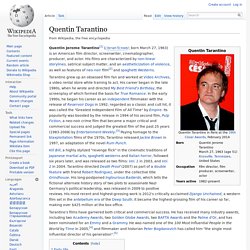

Martin Scorsese. David Lynch. David Keith Lynch (born January 20, 1946) is an American film director, television director, visual artist, musician and occasional actor.

Known for his surrealist films, he has developed a unique cinematic style, which has been dubbed "Lynchian", a style characterized by its dream imagery and meticulous sound design. The surreal, and in many cases, violent, elements contained within his films have been known to "disturb, offend or mystify" audiences.[2] Over his career, Lynch has received three Academy Award nominations[3] for Best Director and a nomination for best screenplay. Lynch has won France's César Award for Best Foreign Film twice, as well as the Palme d'Or at the Cannes Film Festival[4] and a Golden Lion award for lifetime achievement at the Venice Film Festival.
Life and career[edit] Early life: 1946–1965[edit] Philadelphia and short films: 1966–1970[edit] Los Angeles and Eraserhead: 1971–1979[edit] Lynch's Eraserhead, featuring Henry Spencer (Jack Nance). Stanley Kubrick. Stanley Kubrick (/ˈkuːbrɪk/; July 26, 1928 – March 7, 1999) was an American film director, screenwriter, producer, cinematographer and editor who did much of his work in the United Kingdom.

Part of the New Hollywood film-making wave, he is regarded as one of the greatest and most influential directors of all time. His films, typically adaptations of novels or short stories, are noted for their "dazzling" and unique cinematography, attention to detail in the service of realism, and the evocative use of music. Kubrick's films covered a variety of genres, including war, crime, literary adaptations, romantic and black comedies, horror, epic, and science fiction. Kubrick was also noted for being a demanding perfectionist, using painstaking care with scene staging, camera-work and coordinating extremely closely both with his actors and his behind-scenes collaborators. Early life[edit] Kubrick as an infant with his father, Jack Photographic career[edit] Film career[edit]
Alfred Hitchcock. Over a career spanning more than half a century, Hitchcock fashioned for himself a distinctive and recognisable directorial style.[6] He pioneered the use of a camera made to move in a way that mimics a person's gaze, forcing viewers to engage in a form of voyeurism.[7] He framed shots to maximise anxiety, fear, or empathy, and used innovative film editing.[7] His stories often feature fugitives on the run from the law alongside "icy blonde" female characters.[8][9] Many of Hitchcock's films have twist endings and thrilling plots featuring depictions of violence, murder, and crime.

Many of the mysteries, however, are used as decoys or "MacGuffins" that serve the film's themes and the psychological examinations of the characters. Hitchcock's films also borrow many themes from psychoanalysis and feature strong sexual overtones. Through his cameo appearances in his own films, interviews, film trailers, and the television program Alfred Hitchcock Presents, he became a cultural icon.
Quentin Tarantino. Early life[edit] Tarantino was born in Knoxville, Tennessee in 1963.[6] He is the son of actor and amateur musician Tony Tarantino and nurse Connie McHugh.[7][8] He has a younger half-brother named Ron.

Tarantino grew bored with the James Best Acting School and left after two years, although he kept in touch with all of his acting friends. He then landed a job which threatened to interfere with his long-term acting ambitions.[17] As an employee of Video Archives, a now-defunct video rental store in Manhattan Beach, he and fellow movie enthusiasts (including Roger Avary) discussed cinema and customer video recommendations at length. He paid close attention to the types of films people liked to rent and has cited that experience as inspiration for his directorial career.[18] Tarantino has been quoted as saying: "When people ask me if I went to film school I tell them 'no, I went to films.